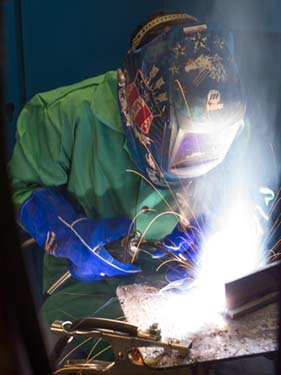In 2014, a coalition of eight Michigan colleges1 launched the Michigan Coalition for Advanced Manufacturing (M-CAM) program. Supported by a Trade Adjustment Assistance Community College and Career Training grant from the U.S. Department of Labor, the program sought to help people transition to living wage jobs in the state’s manufacturing sector.
The timing of the grant award was auspicious. Michigan’s manufacturing sector had suffered during the Great Recession, and by the time it was ready to ramp up again, it was a different sector. It had become much more automated, so available jobs required higher levels of technical skill than they had a few years before. Training programs that had served workers in the industry for many years needed reinvention.
But the M-CAM program was not just a new training program. The partner colleges were looking to test a different approach. The idea was to develop flexible models that incorporated hands-on learning and were aligned with industry standards so students could earn credentials that would help them secure good jobs and build careers more quickly than traditional pathways allowed. The colleges developed a range of new programs in four areas: production, welding, CNC machining, and mechatronics. They revamped curricula, invested in new equipment, and built comprehensive career counseling and student support programs.
What happened?
It worked. At the end of the three-year program, 83 percent of the nearly 4,000 enrolled students were employed, and four in five had earned a credential. Compared to the outcomes of a matched comparison group of students enrolled at the same colleges in similar programs, M-CAM program students were earning between $500 and $1,000 more per quarter and were employed at rates 10-22 percent higher than their peers. (See SPR’s Executive Summary, Video Executive Summary, or Full Report for more detail on overall findings).
Furthermore, our evaluation found that the M-CAM program proved effective for students with a range of educational and occupational backgrounds, including those that are typically not well-served by traditional educational and training. Specifically, the M-CAM program’s additional advising and counseling support, coupled with job placement assistance, helped justice-involved individuals and older students succeed at levels similar to or higher than that of other students.
- Although justice-involved individuals were not a target group for the M-CAM program, at least 10 percent of students served at two of the colleges (Macomb Community College and Kellogg Community) were justice-involved. The justice-involved individuals enrolled in the M-CAM program at these two colleges completed their programs and earned credentials at a higher rate than the average for all M-CAM program students enrolled in their programs. Although these students were considerably less likely to be employed on program entry, they were placed into employment at rates similar to that of other students. (See SPR’s brief and video on justice-involved individuals for more detail).
- A third of the students enrolled in the M-CAM program (over 1200 students in all) were over the age of 40, and most of these students were attending college for the first time. These students were more likely to complete their programs and earn credentials than younger students, and they were only slightly less likely than younger students to be employed when they left the program. Those who had difficulty finding employment were often “career changers” who were seeking to transition to manufacturing from other sectors. Finally, if hired, older students were retained in employment at rates similar to or higher than that of other students (See SPR’s brief and video on older workers for more detail).
Social Policy Research Associates (SPR), the third-party evaluator for the M-CAM program, created a suite of printed and multimedia products intended to help others learn from the M-CAM program experience. A collection of 10 briefs on topics ranging from the experiences of veterans and of women in manufacturing to the nature of counseling and career support are available. See SPR’s website at: spra.com/M-CAM/ for more detail.
1 Bay College, Grand Rapids Community College, Kellogg Community College, Lake Michigan Community College, Lansing Community College, Macomb Community College, Mott Community College and Schoolcraft College.
_________________________________
Heather Lewis-Charp, a Principal at Social Policy Research Associates, was the Project Director for SPR’s Evaluation of the M-CAM initiative. Kristin Wolff is a Senior Associate at SPR, and member of SPR’s board. SPR was honored to help the Michigan team discover what aspects of their programs worked and why and share it with the broader community of community colleges and workforce partners who could benefit from its many lessons. Let us know what you think! Tweet @Social_Policy, comment online.
________________________________
